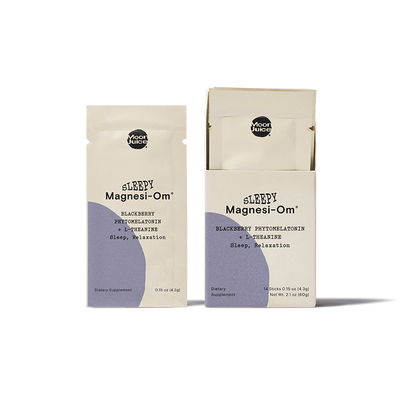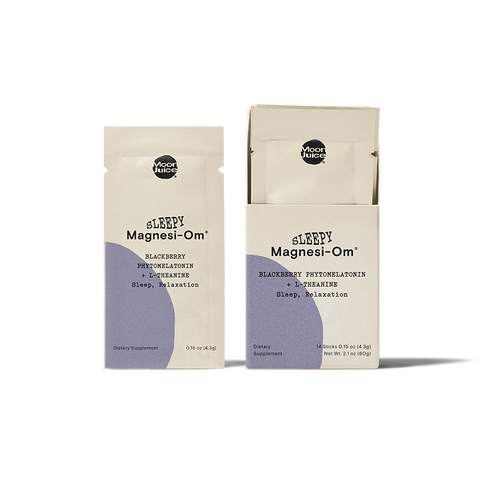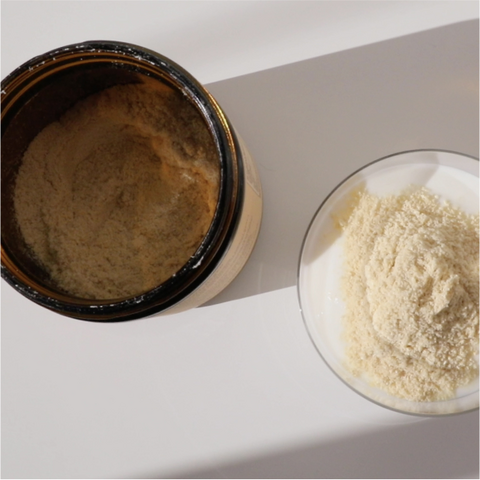Kahryn Pedroza is a writer, intuitive-intersectional wellness educator, and national board certified health and wellness coach. She received a Bachelor of Arts in Communication Studies with a double minor in Sociology and Health Studies from the University of San Francisco. She combines this education with certifications in functional medicine health coaching and yoga teaching and her own rhetorical knack to communicate in person, online, and in print about the intersectionality and accessibility of health, wellness, sustainability, spirituality, and intentional living.
Are you struggling to relax and get a good night's sleep? If you've explored too many relaxation techniques and remedies to count and still find yourself restless, you might be seeking something more potent to promote deep, restorative slumber. If you're considering natural sleep-supportive supplements, you're likely weighing the benefits of Magnesium vs. Melatonin.
In this article, we'll unpack the distinctions between these supplements (Magnesium, a mineral, and Melatonin, a hormone), shed light on their benefits, and help you determine which might be the ideal solution for your slumber challenges. Plus, we'll guide you on safely and effectively combining Magnesium with Melatonin for the best results.
What is Magnesium?
Magnesium is a vital mineral that plays a powerful role in promoting restful sleep. This mineral acts as a co-conductor for over 300 metabolic reactions! As the fourth most abundant mineral in the human body, it’s critical for maintaining healthy sleep, but also overall well-being as well.
One of the essential functions of Magnesium is its involvement in facilitating relaxation and sleep. Even a slight Magnesium deficiency can result in various health issues, like fatigue, poor sleep, numbness and tingling, and muscle cramps. Given its multifaceted importance in our health, Magnesium is unquestionably fundamental for achieving healthy, restorative sleep.
Benefits of Magnesium
Magnesium offers a wealth of benefits that extend beyond simply its sleep-supportive properties. Here are some of the impressive benefits of Magnesium:
-
Enhances Quality & Length of Sleep: Numerous studies have shown that individuals who incorporate Magnesium into their daily routine tend to experience both longer and better sleep.
-
Boosts Brain Health: Magnesium enhances brain function by nurturing the health of your nerves. It achieves this by stimulating the release of gamma-aminobutyric acid (GABA), a neurotransmitter known for its calming effects. This helps soothe an overactive mind and paves the way for a peaceful night's sleep.
-
Supports Stable Mood: Magnesium assists in the production of serotonin, a hormone and neurotransmitter linked to mood regulation. It also plays a crucial role in the synthesis of Melatonin, the "sleep hormone," which regulates your body's internal clock and helps you fall asleep naturally. But more on Melatonin in the next section!
-
Relaxes Muscles: Have you ever experienced those unwelcome leg cramps or muscle spasms at night? Magnesium can come to the rescue by enabling muscle relaxation. This soothing effect can be particularly valuable for anyone dealing with nighttime muscle cramps or discomfort.
-
Maintains Normal Nerve & Muscle Function: Magnesium is valuable for preserving normal nerve function and muscle health. By ensuring your nerves and muscles function optimally, it helps your body maintain regular heart rhythm, blood pressure, and metabolism of glucose and insulin.
Magnesium's far-reaching benefits make it a worthwhile addition to a nightly routine, offering not only peaceful sleep but a range of overall health improvements.
What is Melatonin?
Melatonin is a natural hormone produced by the brain's pineal gland that acts as the timekeeper in your body by regulating your sleep-wake cycle (also known as your circadian rhythm). Secretion of Melatonin typically begins in the evening as it starts to get dark, encouraging your body to transition into the calming state required for restful sleep. This hormone helps regulate the delicate balance between wakefulness and sleep, ensuring you can get the rest you need.
Low levels of Melatonin are essential for your body to maintain its circadian rhythm, making it easier to fall asleep and wake up feeling refreshed. However, the demands of daily life, long travel days, exposure to artificial lighting, late-night screen time, and an altered sleep schedule can all disrupt the body's natural ability to produce Melatonin. And when Melatonin production falls short, it can lead to a range of sleep issues, including difficulty falling asleep, staying asleep, and inability to achieve restorative sleep. Melatonin deficiency can also manifest as anxiety and mood changes, insomnia, lower basal body temperature, and elevated estrogen and progesterone. Clearly, adequate melatonin levels are essential not only for high-quality sleep but also for day-to-day health.
Benefits of Melatonin
Melatonin acts as an irreplaceable sleep regulator with numerous other benefits. Here are some of the advantages of incorporating Melatonin into your sleep routine:
-
Supports a Healthy Sleep-Wake Pattern: Melatonin plays a major role in maintaining circadian rhythm. It helps counteract the negative effects of circadian disruptors like caffeine, blue light, long travel days, shift work, and even alcohol. Melatonin promotes a more regular sleep-wake pattern by fine-tuning your internal body clock.
-
Coordinates Hormones: Melatonin orchestrates the release of other essential hormones crucial for sleep, further improving sleep quality.
-
Helps Fall Asleep & Stay Asleep: One of the standout benefits of Melatonin is its ability to help you fall asleep more quickly and stay asleep throughout the night, so if you’re prone to disruptive low-quality sleep, Melatonin can provide relief and serve as a great natural sleep aid.
-
Defends Against Free Radicals: Melatonin contributes to the detoxification of free radicals, protecting your cells from the damage of oxidative and environmental stress. This allows your body to rest and recover, even in the presence of stress.
-
Helps Insomnia: Melatonin acts as an internal sleep "facilitator," making it a valuable tool for those dealing with insomnia. Research has shown that Melatonin can help you fall asleep even when your body's natural drive to sleep is insufficient, making it easier to achieve better sleep.
-
Adjusts Circadian Rhythm: Melatonin has the remarkable ability to induce phase shifts in the circadian clock. This means it can help realign your internal sleep-wake cycle to your desired schedule. This is particularly useful when you need to adjust to shifts in your daily routine or cope with situational sleep changes caused by things like a late night out, jet lag, or shift work.
Melatonin's multifaceted role as a sleep regulator makes it a versatile tool to improve your sleep quality, maintain your circadian rhythm, and address sleep-related challenges brought on by a variety of lifestyle factors.
Is Magnesium or Melatonin Better for Sleep?
When it comes to choosing between Magnesium and Melatonin for sleep support, understanding their nuances can help you make an informed decision. Magnesium is typically utilized for regular nighttime use, helping to facilitate overall relaxation and maintain a healthy sleep pattern. On the other hand, while Melatonin can be used nightly, using it on an “as-needed” basis is recommended, especially when trying to reset a disrupted sleep-wake cycle.
Taking a Melatonin supplement before bedtime sends a signal to your body that it's time for sleep, which can be particularly helpful for realigning a circadian rhythm that is out of balance. However, be mindful of Melatonin dosage. Conventional Melatonin supplements often come in unnecessarily high doses, with 1-5mg exceeding the body's natural range and flooding brain receptors, leading to that "hangover" feeling the following morning. Instead, opt for a supplemental Melatonin microdose (less than 1mg) to keep you within the natural range without causing grogginess the next day. Studies have found that a microdose of 0.3mg is actually more effective than 1mg at reducing the time it takes to fall asleep, so more isn’t better when it comes to Melatonin for sleep!
Can You Take Magnesium and Melatonin Together?
Yes! You can safely combine Magnesium and Melatonin for even better sleep results. However, it's crucial to avoid overwhelming your system with excessive amounts of these beneficial supplements. When considering using them together, there are several key factors to keep in mind:
-
Quality Matters: Not all Magnesium and Melatonin supplements are created equal. When using them together, consider opting for a dual supplement designed for this specific combination. Ensure that the products you choose meet the highest quality standards.
-
Dosage: Be cautious about the dosage of Melatonin you take, as excessive amounts can disrupt your natural sleep pattern. A microdose of Melatonin, usually less than 1mg, is often sufficient to improve your sleep without causing grogginess the next day.
-
Supplement Synergy: Some studies have suggested that a combination of nightly supplements, like Melatonin + Magnesium + Zinc, or Melatonin + Magnesium + B Vitamins can be beneficial in improving insomnia, regardless of its cause. If you don’t have insomnia but experience low-quality sleep on a situational basis, look for a Melatonin + Magnesium + L-Theanine sleep blend.
-
Plant-Based Melatonin: Conventional melatonin supplements are either synthetic and made with toxic solvents or animal-based and made from the pineal glands of cows and sheep. Look for Phytomelatonin, aka Melatonin derived from plants.
Take Sleepy Magnesi-Om for Sleep and Relaxation
Sleepy Magnesi-Om® helps you sleep fast and deep with Magnesium, a microdose of plant-based Melatonin, and L-Theanine.* While the microdose of Phytomelatonin (extracted from organically grown alfalfa and chlorella) helps signal your body that it's time to sleep, the Magnesium and L-Theanine components work in harmony to keep you relaxed and asleep throughout the night.* This Magnesium and Melatonin supplement dissolves instantly in water, with an organic blackberry flavor and zero sugar for a gentle, natural way to support your slumber.
Sign Up, Nerd Out
Get wellness tips, education, and recipes
delivered straight to your inbox.
Get wellness tips, education,
and recipes delivered
straight to your inbox.
Takeaways
After exploring the differences between two powerful sleep-supportive supplements, Magnesium and Melatonin, and exploring their individual benefits, you're now well-equipped to make an informed choice tailored to your unique sleep needs! Magnesium, a vital mineral with multiple health benefits, offers a sound foundation for restful slumber. Meanwhile, Melatonin, a hormone produced by the brain, serves as an internal sleep regulator, ensuring a smooth transition into sleep time.
Remember, the decision between these two isn't a matter of one being better than the other; it's about understanding when to use each. Magnesium can act as your nightly companion, helping with overall relaxation and sleep pattern support. Melatonin, on the other hand, is the as-needed ally, perfect for realigning a disrupted sleep-wake cycle. Don’t forget that quality and dosage matter when combining these supplements. For optimal results, consider a dual supplement like Sleepy Magnesi-Om®, which has been carefully crafted to provide non-groggy nighttime support, making it easier to drift into sleep.*
Are you struggling to relax and get a good night's sleep? If you've explored too many relaxation techniques and remedies to count and still find yourself restless, you might be seeking something more potent to promote deep, restorative slumber. If you're considering natural sleep-supportive supplements, you're likely weighing the benefits of Magnesium vs. Melatonin.
In this article, we'll unpack the distinctions between these supplements (Magnesium, a mineral, and Melatonin, a hormone), shed light on their benefits, and help you determine which might be the ideal solution for your slumber challenges. Plus, we'll guide you on safely and effectively combining Magnesium with Melatonin for the best results.
What is Magnesium?
Magnesium is a vital mineral that plays a powerful role in promoting restful sleep. This mineral acts as a co-conductor for over 300 metabolic reactions! As the fourth most abundant mineral in the human body, it’s critical for maintaining healthy sleep, but also overall well-being as well.
One of the essential functions of Magnesium is its involvement in facilitating relaxation and sleep. Even a slight Magnesium deficiency can result in various health issues, like fatigue, poor sleep, numbness and tingling, and muscle cramps. Given its multifaceted importance in our health, Magnesium is unquestionably fundamental for achieving healthy, restorative sleep.
Benefits of Magnesium
Magnesium offers a wealth of benefits that extend beyond simply its sleep-supportive properties. Here are some of the impressive benefits of Magnesium:
-
Enhances Quality & Length of Sleep: Numerous studies have shown that individuals who incorporate Magnesium into their daily routine tend to experience both longer and better sleep.
-
Boosts Brain Health: Magnesium enhances brain function by nurturing the health of your nerves. It achieves this by stimulating the release of gamma-aminobutyric acid (GABA), a neurotransmitter known for its calming effects. This helps soothe an overactive mind and paves the way for a peaceful night's sleep.
-
Supports Stable Mood: Magnesium assists in the production of serotonin, a hormone and neurotransmitter linked to mood regulation. It also plays a crucial role in the synthesis of Melatonin, the "sleep hormone," which regulates your body's internal clock and helps you fall asleep naturally. But more on Melatonin in the next section!
-
Relaxes Muscles: Have you ever experienced those unwelcome leg cramps or muscle spasms at night? Magnesium can come to the rescue by enabling muscle relaxation. This soothing effect can be particularly valuable for anyone dealing with nighttime muscle cramps or discomfort.
-
Maintains Normal Nerve & Muscle Function: Magnesium is valuable for preserving normal nerve function and muscle health. By ensuring your nerves and muscles function optimally, it helps your body maintain regular heart rhythm, blood pressure, and metabolism of glucose and insulin.
Magnesium's far-reaching benefits make it a worthwhile addition to a nightly routine, offering not only peaceful sleep but a range of overall health improvements.
What is Melatonin?
Melatonin is a natural hormone produced by the brain's pineal gland that acts as the timekeeper in your body by regulating your sleep-wake cycle (also known as your circadian rhythm). Secretion of Melatonin typically begins in the evening as it starts to get dark, encouraging your body to transition into the calming state required for restful sleep. This hormone helps regulate the delicate balance between wakefulness and sleep, ensuring you can get the rest you need.
Low levels of Melatonin are essential for your body to maintain its circadian rhythm, making it easier to fall asleep and wake up feeling refreshed. However, the demands of daily life, long travel days, exposure to artificial lighting, late-night screen time, and an altered sleep schedule can all disrupt the body's natural ability to produce Melatonin. And when Melatonin production falls short, it can lead to a range of sleep issues, including difficulty falling asleep, staying asleep, and inability to achieve restorative sleep. Melatonin deficiency can also manifest as anxiety and mood changes, insomnia, lower basal body temperature, and elevated estrogen and progesterone. Clearly, adequate melatonin levels are essential not only for high-quality sleep but also for day-to-day health.
Benefits of Melatonin
Melatonin acts as an irreplaceable sleep regulator with numerous other benefits. Here are some of the advantages of incorporating Melatonin into your sleep routine:
-
Supports a Healthy Sleep-Wake Pattern: Melatonin plays a major role in maintaining circadian rhythm. It helps counteract the negative effects of circadian disruptors like caffeine, blue light, long travel days, shift work, and even alcohol. Melatonin promotes a more regular sleep-wake pattern by fine-tuning your internal body clock.
-
Coordinates Hormones: Melatonin orchestrates the release of other essential hormones crucial for sleep, further improving sleep quality.
-
Helps Fall Asleep & Stay Asleep: One of the standout benefits of Melatonin is its ability to help you fall asleep more quickly and stay asleep throughout the night, so if you’re prone to disruptive low-quality sleep, Melatonin can provide relief and serve as a great natural sleep aid.
-
Defends Against Free Radicals: Melatonin contributes to the detoxification of free radicals, protecting your cells from the damage of oxidative and environmental stress. This allows your body to rest and recover, even in the presence of stress.
-
Helps Insomnia: Melatonin acts as an internal sleep "facilitator," making it a valuable tool for those dealing with insomnia. Research has shown that Melatonin can help you fall asleep even when your body's natural drive to sleep is insufficient, making it easier to achieve better sleep.
-
Adjusts Circadian Rhythm: Melatonin has the remarkable ability to induce phase shifts in the circadian clock. This means it can help realign your internal sleep-wake cycle to your desired schedule. This is particularly useful when you need to adjust to shifts in your daily routine or cope with situational sleep changes caused by things like a late night out, jet lag, or shift work.
Melatonin's multifaceted role as a sleep regulator makes it a versatile tool to improve your sleep quality, maintain your circadian rhythm, and address sleep-related challenges brought on by a variety of lifestyle factors.
Is Magnesium or Melatonin Better for Sleep?
When it comes to choosing between Magnesium and Melatonin for sleep support, understanding their nuances can help you make an informed decision. Magnesium is typically utilized for regular nighttime use, helping to facilitate overall relaxation and maintain a healthy sleep pattern. On the other hand, while Melatonin can be used nightly, using it on an “as-needed” basis is recommended, especially when trying to reset a disrupted sleep-wake cycle.
Taking a Melatonin supplement before bedtime sends a signal to your body that it's time for sleep, which can be particularly helpful for realigning a circadian rhythm that is out of balance. However, be mindful of Melatonin dosage. Conventional Melatonin supplements often come in unnecessarily high doses, with 1-5mg exceeding the body's natural range and flooding brain receptors, leading to that "hangover" feeling the following morning. Instead, opt for a supplemental Melatonin microdose (less than 1mg) to keep you within the natural range without causing grogginess the next day. Studies have found that a microdose of 0.3mg is actually more effective than 1mg at reducing the time it takes to fall asleep, so more isn’t better when it comes to Melatonin for sleep!
Can You Take Magnesium and Melatonin Together?
Yes! You can safely combine Magnesium and Melatonin for even better sleep results. However, it's crucial to avoid overwhelming your system with excessive amounts of these beneficial supplements. When considering using them together, there are several key factors to keep in mind:
-
Quality Matters: Not all Magnesium and Melatonin supplements are created equal. When using them together, consider opting for a dual supplement designed for this specific combination. Ensure that the products you choose meet the highest quality standards.
-
Dosage: Be cautious about the dosage of Melatonin you take, as excessive amounts can disrupt your natural sleep pattern. A microdose of Melatonin, usually less than 1mg, is often sufficient to improve your sleep without causing grogginess the next day.
-
Supplement Synergy: Some studies have suggested that a combination of nightly supplements, like Melatonin + Magnesium + Zinc, or Melatonin + Magnesium + B Vitamins can be beneficial in improving insomnia, regardless of its cause. If you don’t have insomnia but experience low-quality sleep on a situational basis, look for a Melatonin + Magnesium + L-Theanine sleep blend.
-
Plant-Based Melatonin: Conventional melatonin supplements are either synthetic and made with toxic solvents or animal-based and made from the pineal glands of cows and sheep. Look for Phytomelatonin, aka Melatonin derived from plants.
Take Sleepy Magnesi-Om for Sleep and Relaxation
Sleepy Magnesi-Om® helps you sleep fast and deep with Magnesium, a microdose of plant-based Melatonin, and L-Theanine.* While the microdose of Phytomelatonin (extracted from organically grown alfalfa and chlorella) helps signal your body that it's time to sleep, the Magnesium and L-Theanine components work in harmony to keep you relaxed and asleep throughout the night.* This Magnesium and Melatonin supplement dissolves instantly in water, with an organic blackberry flavor and zero sugar for a gentle, natural way to support your slumber.
Takeaways
After exploring the differences between two powerful sleep-supportive supplements, Magnesium and Melatonin, and exploring their individual benefits, you're now well-equipped to make an informed choice tailored to your unique sleep needs! Magnesium, a vital mineral with multiple health benefits, offers a sound foundation for restful slumber. Meanwhile, Melatonin, a hormone produced by the brain, serves as an internal sleep regulator, ensuring a smooth transition into sleep time.
Remember, the decision between these two isn't a matter of one being better than the other; it's about understanding when to use each. Magnesium can act as your nightly companion, helping with overall relaxation and sleep pattern support. Melatonin, on the other hand, is the as-needed ally, perfect for realigning a disrupted sleep-wake cycle. Don’t forget that quality and dosage matter when combining these supplements. For optimal results, consider a dual supplement like Sleepy Magnesi-Om®, which has been carefully crafted to provide non-groggy nighttime support, making it easier to drift into sleep.*
















